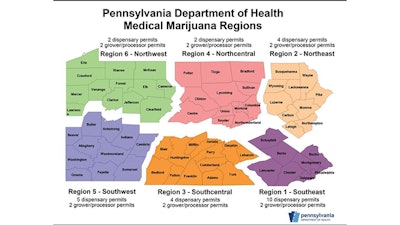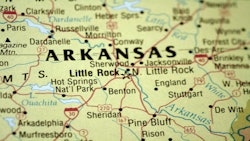
This article was updated 5/3/17 at 10:01 a.m. to reflect comments added by Pennsylvania's Department of Health Press Secretary April Hutcheson.
More information regarding Pennsylvania’s medical marijuana program was released by the state Secretary of Health Dr. Karen Murphy last week, as the Health Department released the names and location of companies that have applied for the 39 medical cannabis business licenses potentially available within the state.
Of the more than 500 packages the state received, 258 have been logged and are currently under review. One hundred and thirty-two of those were for cultivation licenses. The applications were categorized by location, and the Southeast region (comprising Philadelphia and its suburbs) had the highest concentration of grower applications with nearly a quarter of potential growers having applied for licenses in the area (31 license applications). The Northcentral region–home to three state and one national forest—received the least amount of applications with only 17.
Pennsylvania's Health Department Press Secretary April Hutcheson said, "We estimated that it was a 90-day process, and our original estimates were up to about 900 applications ... prior to opening up the application for the application submittal period.
"The numbers we have now are essentially a preliminary of where we are to date as of last week. So I believe in the next couple weeks we’ll be able to have some of those final numbers for you as to how many total applications we received," she added.
“This has been a tremendous undertaking by a team working day and night to ensure that we have a safe and effective way to get medication to patients,” Secretary Murphy said during a briefing April 26. “As we continue to review permit applications and work on our temporary regulations based on feedback from the community, we move closer and closer to getting this desperately needed medicine into the hands of those who will benefit most from it.”
Cultivation applications came from varied sources: Some are born-and-bred Pennsylvania companies with interesting site locations, such as Bunker Botanicals LLC. If selected, Bunker Botanicals would retrofit a Cold War-era bunker in the Southeast region into a medical cannabis cultivation facility.
Other applicants are well-established cannabis companies in other legal markets trying to expand their businesses into what is anticipated to be a lucrative Pennsylvania market. (Projections by The Arcview Group estimate Pennsylvania will represent 9.2 percent of the country’s $22 billion value by 2020.)
One such applicant is Sanctuary Medicinals, which operates a vertically integrated operation with 15,000 square feet of cultivation and processing space and a dispensary in Rochester, N.H., along with a 36,000-square-foot facility that breaks ground next month in Littleton, Mass., and plans to open three dispensaries in the state. Sanctuary Medicinal CEO Jason Sidman says the company puts a heavy focus on extraction and fractionation to develop products such as topicals, tinctures, gels, creams, ointments, transdermal patches and more.
Sanctuary Medicinals has applied for seven grower/processor and dispensary licenses in Pennsylvania, which are mixed throughout the program’s six specified regions.
“We don’t know if we’re just going to get a dispensing license, or a cultivation license, or both,” Sidman said.
The decision to potentially move into the Pennsylvania market reflects the state’s well-thought-out program, he added. “They took a tremendous amount of time crafting their act,” Sidman said.
In regard to the application process itself, Sidman noted, “What Pennsylvania did that was superior to other [states’] applications is that they put a 5,000-word max. word count per answer. Now, that is huge. Because what happens is, in other applications I’ve seen, sometimes the word count can get out of control … then it really bogs down the grading process and makes it much more difficult for the people who are scoring these to actually do it in a timely and efficient manner.”
In addition to a lengthy list of 17 qualified medical conditions, Sidman is also in favor of the limit on license holders within the state.
“One of the biggest highlights of this market in Pennsylvania is that it’s a limited-license market. … That’s, in my opinion, the best way to do it because if you go west of the Mississippi [River], it’s almost like an unlimited-license environment. … I believe though a merit-based application, which is what this is, meaning it’s scored, it’s graded–the best will rise to the top.”
If Sanctuary Medicinals is not granted a license, Sidman says that the process was still worth the investment. And the company will try again once the Pennsylvania licensing process potentially opens back up again. “There’s risk involved, and the risk is, you may not get a license. And that’s just a reality,” he said. “[But] it’s absolutely worth it to put all the time in, and all the work and the capital in, in order to … bring the best medicine to the patients. It’s really rewarding.”
For those applicants who do not receive licenses for this phase of the state's medical marijuana program, it's possible they could they could receive another opportunity to apply once the program is up and running. "There is a [medical marijuana advisory] board that’s built into the law itself ... and that board can decide on any kind of expansion in terms of illnesses and even expansion of the program," Pennsylvania Department of Health Press Secretary April Hutcheson said. "We need to see in this first phase [if the program will] meet the immediate need, and then decide based on the access to medication, what the expansion would look like,"












.jpg?auto=format%2Ccompress&fit=crop&h=141&q=70&w=250)













